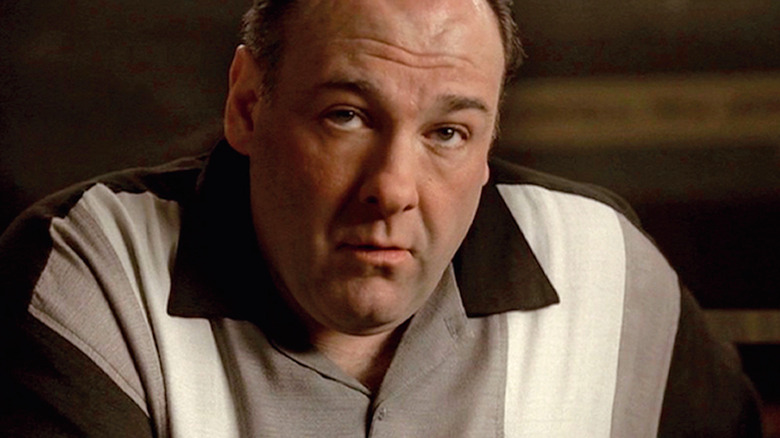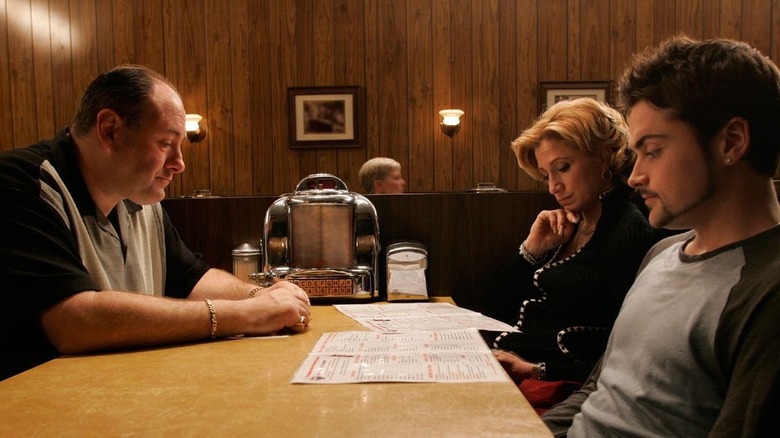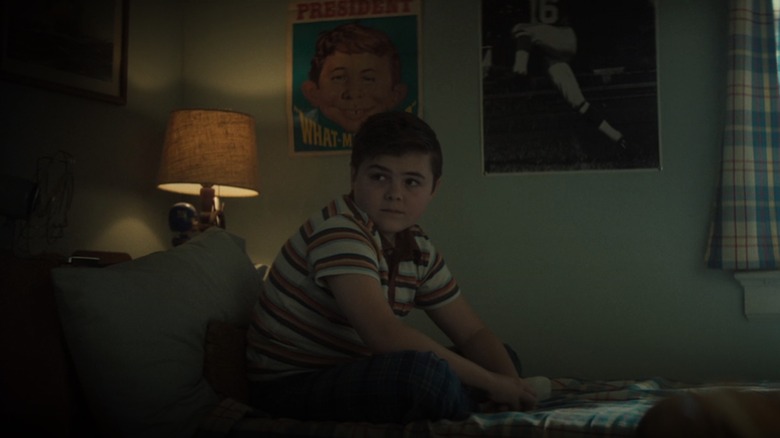Don't Stop Believin': Does The Many Saints Of Newark Finally Reveal What Happened To Tony Soprano?
Spoilers for "The Sopranos" and "The Many Saints of Newark" follow.
On the night of June 10, 2007, HBO aired "Made in America," the final episode of "The Sopranos." It was a major event as we all gathered around our TVs to see what would become of Tony Soprano. The final minutes of the episode were almost unbearably tense, as Tony, his wife Carmella, and his son A.J. sat in Holsten's Brookdale Confectionery with the song "Don't Stop Believin'" playing on the jukebox. In this final scene, the Soprano family is waiting for daughter Meadow to arrive. As they wait, Tony keeps glancing around Holsten's, eyeing various people with what seems to be suspicion. Meadow finally arrives outside and keeps trying to parallel park her car, all while "Don't Stop Believin'" keeps on playing. The tension continues to mount – nothing bad is actually happening on the screen, mind you (although parallel parking is no joke), but the way the scene is edited, coupled with the knowledge that this is the show's final episode, creates a state of ever-mounting anxiety.
Meadow finally gets the car parked and moves towards the entrance. She opens the door, causing a bell to ring. As this happens, the camera cuts to a close-up on Tony's face. He looks up. And then – nothing. The screen cuts to black. If you watched this moment live – as I did – there's a pretty good chance you thought something had gone wrong. That perhaps HBO had been overwhelmed by so many people watching the finale that the signal got lost. Or that something had short-circuted in your TV. I can distinctly remember watching it in my childhood bedroom and thinking, with anger, "Oh damn, did my crappy TV just die?!"
The black screen lasted for ten seconds. On paper, that doesn't sound very long. But in terms of TV, it feels like an eternity. And then the credits rolled. When those credits started, it slowly dawned on viewers that the cut to black was intentional. But what the hell did it all mean? And does the new "Sopranos" prequel movie "The Many Saints of Newark" finally give us a real answer?
The Fate of Tony Soprano
So what happened at the end of "The Sopranos?" More specifically, what happened to Tony Soprano? People immediately offered up theories on what the ending – and those 10 seconds of blackness – meant. The most common theory – and one I personally believe myself – is that Tony was whacked. "The Sopranos" had a weird history of attracting viewers who tuned in simply to see wiseguys bump each other off, but the show was more than that. It was cerebral and intellectual, and that sometimes bothered people. So I want to make it very clear that I never watched the show for the murders. I watched it for the storytelling, and the writing, and the characters. I didn't enter into the finale with a bloodlust, nor did I immediately assume that the show would end with Tony dying.
However, those final dark seconds, coupled with Tony nervously looking around the diner, sure seem to point to the eternal darkness of death. On top of that, there was a potential clue in the final season hinting towards all of this. In the episode "Soprano Home Movies," Tony's brother-in-law, Bobby Bacala, talks with Tony about how sudden, and final, death will be, especially for mobsters. "You probably don't even hear it when it happens, right?" Bobby says. And just in case anyone forgot about that conversation, "The Sopranos" went ahead and had a flashback to that exact moment in the second-to-last episode, "The Blue Comet."
So it all seems pretty cut and dry, right? Tony got whacked, correct? Well ... not so fast. The reason there's no real answer to the question of what happened to Tony is that the folks involved with "The Sopranos" have remained very coy about that ending over the years. "Sopranos" creator David Chase has been famously illusive when it comes to providing an answer, although he's offered plenty of hints.
During an interview for the excellent 2019 book "The Sopranos Sessions," Chase was asked once again about the ending – and he seemed to finally give the game away when he called the moment a "death scene." When this fact was pointed out to Chase, he tried to backpedal a bit. Sort of. Interviewer Alan Sepinwall continued to press the matter, saying: "So the point of the scene is not 'they whacked him in the diner?' It's that he could have been whacked?" To which Chase replied:
"Yes, that he could have been whacked in the diner. We all could be whacked in a diner. That was the point of the scene. He could have been whacked."
To me, that reads like Chase is saying Tony probably got whacked, but if you want to interpret the final scene in other ways, that's okay, too. It's not so much a moment that says Tony died, it's a moment that said that if Tony didn't die that day in Holsten's, he will die, sooner or later. And his death will probably be sudden and violent, since that's how most mobsters die.
"I Don't Want That to Happen to Me"
The new film "The Many Saints of Newark" takes us back in time, to when Tony Soprano was a kid. For most of the film, we see Tony in his teen years, played by Michael Gandolfini. But when we first meet him, he's even younger, played by William Ludwig. In an early scene, the younger Tony watches as one of his father's mob friends is shot in the back by cops. Later, Tony is talking with his uncle Dickie Moltisanti (Alessandro Nivola) about life, and his future. Tony is a getting in trouble at school, and Dickie wants him to get his act together and stop being bad. Tony promises he will be, but then brings up the shooting he witnessed.
"I saw the cops shoot a friend of my dad right in the back," he tells Dickie. "I don't want that to happen to me."
Now, perhaps I'm just reading too much into the line. But the moment I heard the young Tony say those words, it caught my attention. Because "Tony was shot in the back and killed" is that very familiar, very prevalent "Sopranos" finale theory. It can't be a coincidence that screenwriters David Chase and Lawrence Konner put those words in Tony Soprano's mouth, can it? It really does seem to be a line that's meant to be dripping with tragic irony – the young Tony says he doesn't want to grow up and get shot in the back, but that's exactly what happens to him (if you buy into the "Tony died at the end of the show" theory, that is).
In the end, I doubt David Chase will ever come right out and say "Yes, Tony died," or "No, Tony lived." He's been playing coy for too long now, and I'm pretty sure he enjoys leaving the official answer an eternal mystery. Still, that "Many Saints of Newark" line sure seems to be hinting at the true fate of Tony Soprano.


